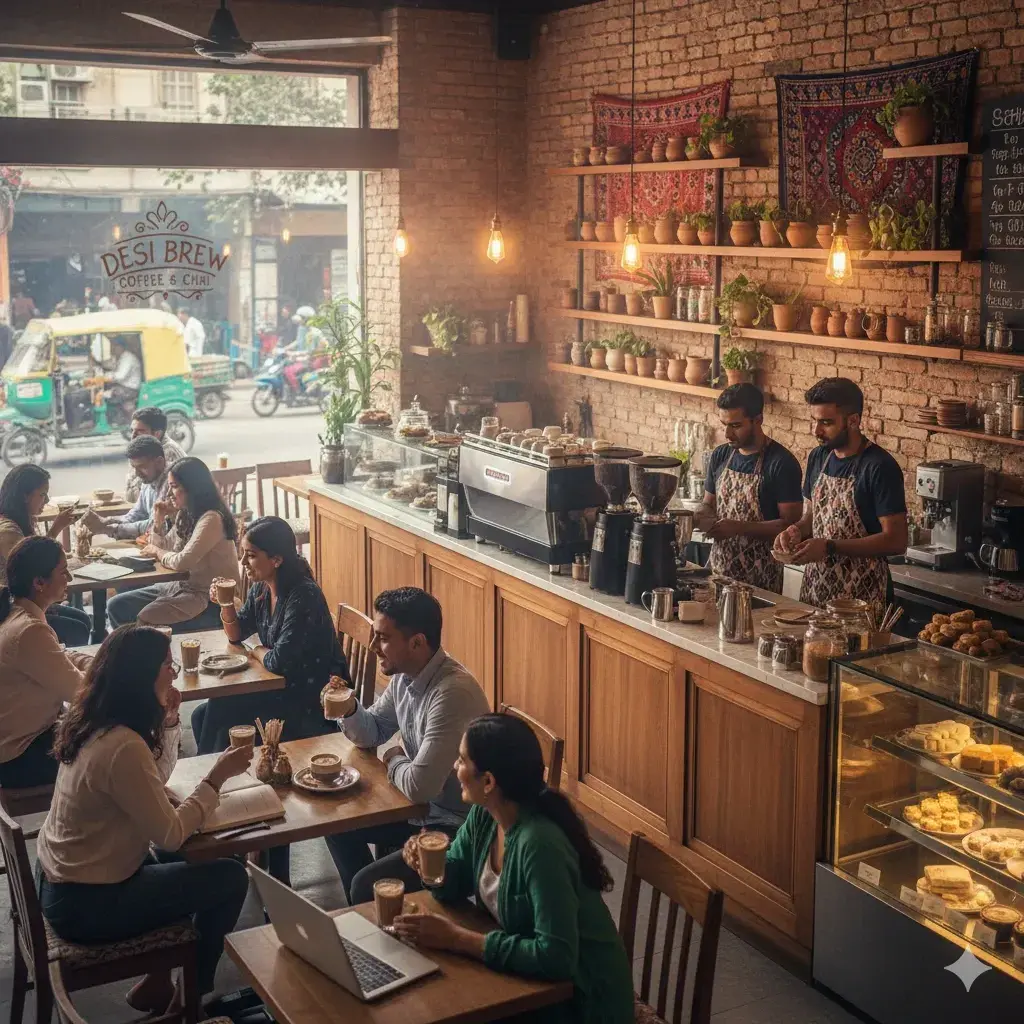(Image - Nano Banana)
I’m a serial cafe-hopper. My wallet suffers a lot, but hey, it makes for a good newsletter. I’m also somebody who tries to decode culture everywhere I go. Cafes are no exception.
For a nation that loves its chai, India has a rather long cafe history. I was pleasantly surprised.
It started in the 1900s when Indian Coffee Houses emerged as hangout spots for the elite class. Housed in colonial-styled buildings, these cafes served steaming hot coffee while offering a space to discuss politics, philosophy, and other such intellectual topics.
Fast forward to the 1990s.
Economic reforms opened India to the world, and with them came a new kind of cafe culture. Cafe Coffee Day, founded in 1996, became one of India's most popular and widespread coffee chains. At its peak, CCD boasted over 1700 outlets. This was where you would go for your first date or to hangout with old friends.
In 2012, Starbucks arrived.
That move (along with post-pandemic inspiration) led to a wave of homegrown specialty coffee brands: Blue Tokai, Third Wave Coffee, Subko Coffee. The humble cafe got a revamp, elevating into an experience with fine beans and finer aesthetics.
What emerged tells you everything about what young India wants right now.
Latte Layers Here
When you peel back the layers, you observe cafes are rarely about the coffee itself. Sure, that’s a part of the experience, but the hidden layers are far more fascinating:
1. Knowledge (What You Learn)
Coffee demands understanding.
Where did the beans grow? How were they processed? Which roasting profile brings out what flavors? These used to be pretentious questions, but they’re getting more common.
Specialty cafes have made coffee education part of the package. You learn the difference between a V60 and an Aeropress, why water temperature matters, what "single-origin" means...
This isn't accidental. There is a growing knowledge economy around coffee.
You can't just walk in and order a good old coffee without feeling like you've ordered the wrong one (Wait, this doesn’t have any water?). The cafe teaches you. Learning itself becomes part of the experience.
2. Status (What You Signal)
Chai is everywhere. Coffee is deliberate.
That's the first signal. Choosing coffee over chai already says something about aspiration, about wanting to be seen a certain way, about economic mobility made visible.
But it goes deeper.
Order oat milk instead of regular. Specify light roast. Ask about the farm. Each choice signals fluency in a code that separates those who know from those who don't.
You grab a seat by the window and place the latte just in the frame that overlooks a lush green backdrop for your Instagram story. Throw in a Macbook too, while you’re at it.
Showing you belong to a space where INR 400 for a single drink makes sense. Welcome to the world of taste and exclusivity.
3. Community (Who You Connect With)
Cafes solve a problem: Where do you exist between work and home?
Somewhere else, designed for this in-between state. Sociologists call this the third place.
Evening hours after 5 PM see the most activity. From a caffeination lens, that’s the worst time to drink coffee unless you want to stay up all night. That's also when cafes transform into social hubs though. Friends catching up, post-work meetings, first dates…
Specialty coffee brands take it a step further as community builders. They host events (heard of a coffee rave?), run workshops, and create spaces where people with similar tastes connect.
You get a fleeting community in an increasingly lonely world.
4. Identity (Who You Become)
Post-pandemic India saw a surge in freelancers, remote workers, people building careers outside traditional offices. And they needed somewhere to go.
The cafe became that somewhere.
Cafes offer the appearance of productivity. You're in public, therefore accountable. You're surrounded by others doing the same thing, therefore motivated. You're in a designed space, therefore inspired.
But it's deeper than workspace.
The cafe lets you construct an identity. You become the entrepreneur who works from beautiful spaces or the creative who needs the right environment.
Who you are, or who you hope to become, shows up in the cafe.
Bru to Brew
Okay look, most Indians aren’t sipping pour-overs under pendant lights.
Over 60% of India’s coffee consumption is still instant. It’s stirred into hot milk in metal tumblers, drunk on balconies or office desks. No tasting notes, no performance.
But that’s the point.
The rise of specialty cafes doesn’t replace India’s coffee history. It reveals how coffee is bending around new cultural needs.
We live in a country where mobility, be it economic or aesthetic, is a shared hunger. Coffee is adapting. The same beverage that signals comfort in a home signals aspiration in a cafe.
And in India, what’s being revealed is a desire for:
- Chasing curiosity outside traditional education
- Signaling status through daily rituals over grand gestures
- Having productive spaces outside of just work and home
- Building meaningful connection in a disconnected society
You see different needs elsewhere. In Sweden, coffee protects breaks. Fika is a cultural institution, where work stops and people gather over coffee. Alternatively, in the South Korean culture of intense work pressure and small living spaces, cafes became rented refuge where people study for hours or work remotely.
Which leads nicely to my conclusion…
Grounds for Thought
Cafes are microcosms of culture, compressed spaces where bigger forces play out quietly. Ambition, belonging, class, taste, identity…all of it finds a chair, a table, a drink.
So if you want to understand where India is headed, head to a cafe.
Because in the next decade, interesting Indian innovations might not just be technological or infrastructural. They’ll be about how we build taste, how we create public spaces, how we choose to show up and be seen.
Outside the cafe? You’ll find tapri waali coffee for INR 20 too.
And that's the most revealing thing about India right now. Our ability to hold contradictions, to build the new while keeping the old. Both the tapri and the specialty cafe are true. Both tell you something about this country. You just have to know which one to walk into and what to look for when you do.
Me? I walk into both. Oh, and I’m guilty of doing everything I described above, which makes me curious:
What parts of your identity, say your ambition or your connection with others, are more visible in cafes than they are at home or work?
If you enjoyed this guest edition and have a story, idea, or perspective you’d like to share, we’d love to hear from you.
Write to us at plainsight@wyzr.in, and we will feature interesting responses in a future edition.
What we’re reading this week:
Before The Coffee Gets Cold by Toshikazu Kawaguchi. In a tiny Tokyo café, time travel is possible, but just for the length of a warm cup. A gentle, moving tale about regrets, second chances, and the comfort of ordinary moments.
Regards,
Akshat

